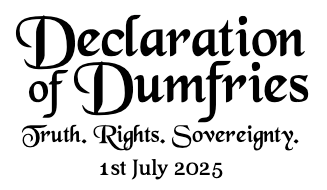Where You Stood During COVID…
Is Where You Truly Stand on Sovereignty (Guest article by Mairi Allan)
Let's begin by discussing what sovereignty means—it is when a country has full control over its own territory, laws, government, and decisions, without being ruled or dictated to by another country or external force.
An example could be Scotland’s independence movement—it’s about national sovereignty—the idea that decisions affecting Scotland should be made in Scotland, not at Westminster.
Individual sovereignty refers to your right to make choices about your own body, life, and beliefs without being coerced or controlled by others—especially the state.
During the COVID pandemic, debates around vaccine mandates, lockdowns, and mask rules often centred on personal sovereignty—whether people had the right to say no to government-imposed health measures.
Sovereignty is about:
Autonomy – The right to self-rule.
Responsibility – Bearing the consequences of your choices.
Freedom – Living without undue interference.
It’s not just a political term—it’s a value. It’s the foundation of democracy, liberty, and self-determination. And when people or nations willingly surrender their sovereignty out of fear or comfort, they risk losing both their freedom and their identity.
In times of crisis, people show their true colours. When history looks back on the COVID-19 pandemic, it won’t just assess governments and policies—it will judge the character of nations. And for Scotland, what we saw was a sobering departure from the ideals we claim to hold dear: courage, resilience, and sovereignty.
Instead of standing tall, we knelt. Instead of thinking critically, we obeyed. Instead of protecting the vulnerable and upholding rights, we allowed fear to dictate our moral compass. It was a time when the government overstepped, and the people—rather than pushing back—invited it in.
Perhaps no example is more troubling than what we did to our children. Scotland, like much of the UK, enforced mask mandates in schools—despite overwhelming evidence that children were at minimal risk from the virus, and growing concern about the psychological harm of such measures. But it wasn’t about risk; it was about submission. We allowed irrational adult fears to be projected onto children, burdening them with the emotional toll of a pandemic they barely understood and were least affected by.
Let’s be absolutely clear: local authorities had no lawful authority to force mask-wearing in schools in the way that they did. They acted on guidance, not legislation. And yet, not only did the public accept it—they defended it. Teachers enforced it. Parents justified it. Children, voiceless in the whole affair, simply complied.
And herein lies the deeper issue: the erosion of sovereignty wasn’t just top-down—it was internalised. We did not demand better. We did not ask hard questions. We accepted the narrative that anyone resisting was dangerous, selfish, or ignorant. In doing so, we betrayed the very essence of personal and national sovereignty: the idea that individuals have the right—and the responsibility—to govern themselves.
What COVID exposed is that too many in Scotland have become comfortable with being looked after. We've become a nation that equates safety with submission and views state intervention not as a necessary evil, but as a welcome parent. It’s no wonder then that the concept of independence, once a rallying cry for personal and national dignity, now feels hollow. Independence means nothing without the will to stand alone.
Sovereignty cannot exist in a culture that refuses to carry its own burdens.
Some will say that these measures were justified by the scale of the crisis. But that argument only confirms the problem. Rights that vanish in the face of fear are not rights at all—they are privileges granted by the state and withdrawn at will. Real sovereignty is tested not in times of peace, but in moments of panic. And too many of us failed that test.
This is not a call for recklessness or denial of the seriousness of a global pandemic. It is a call to remember that democratic societies require vigilance, dissent, and a healthy scepticism of authority—especially when that authority claims to act “in our best interest.”
We must never forget what was done in the name of safety, and we must never allow it to happen again. The next time a crisis comes—and it will—we need to ask: have we learned anything? Or will we once again trade freedom for comfort, sovereignty for security, and principle for silence?
Where you stood during COVID is where you truly stand on sovereignty. It’s time we started being honest about that.
We cannot undo the damage done, but we can choose to learn from it. We can recognise that real sovereignty—individual or national—requires courage, dissent, and accountability. Nicola Sturgeon may no longer be in office, but the legacy of the choices made under her leadership lingers. As a nation, we must decide whether we are truly ready to stand on our own two feet, or whether we will continue to demand to be shielded from the harsh winds of reality.
Because in the end, where you stood during COVID is where you truly stand on sovereignty—and if we can’t defend our freedoms in a crisis, we never really had them at all.
By Mairi Allan
Right of Reply: Contact DoD@DeclarationofDumfries.co.uk with additional or alternative information. Anonymity guaranteed.







The problem with freedoms is we have been educated not to have them. My daughter lives near Edinburgh and I am constantly amazed by the right to roam pretty much anywhere you like (in Scotland).
In England, we are "free" to walk on a mere 8% of the countryside, and fish in 3% of the rivers.
We think a bit of Dartmoor is just lovely.
It's worse in the USA, where the proles are banned from 90% of the Grand Canyon. 90%!?
That's not freedom, but it's why when the government tells people to wear a mask, the overwhelming majority meekly comply.
Phenomenal writing Mike! I've often said vs SNP independence what they really mean is IN-DEPENDANCE!